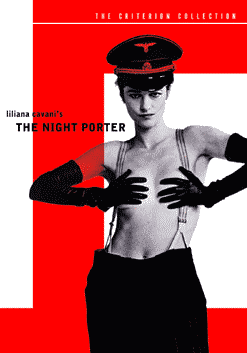Is there an actual line one can draw between cinematic art and exploitation? If so, where should it be drawn? Are high production values and skilled acting enough to elevate a tale of Nazi-themed sado-masochism from the realm of the grindhouse? When confronted with Liliana Cavani's The Night Porter in 1974, film critics were forced to supply answers to these questions--and many answered in the negative. A lukewarm response would never do: the very invocation of Nazi Germany demands an extreme reaction, be it in the context of a historical drama (Judgment at Nuremberg), a musical satire (The Producers), or, as seen recently, a reality-bending fable (Life is Beautiful). But Cavani had gone beyond what viewers of the day were accustomed to (let alone from a female director), even where the topic was involved: its dark psychology and disturbing imagery offered no compromise . . . and the film itself offered no hero. Cavani's film was released before such Nazi torture epics as Ilsa, She-Wolf of the SS and a string of similar European imports hit U.S. screens. It has been argued with considerable validity that The Night Porter helped pave the way for their very existence. But is it truly cut from the same cloth? Cavani gives us Max (Dirk Bogarde), an ex-Nazi officer now working as a porter in a hotel in the Vienna of 1957. In addition to his room service duties, Max attends scheduled gatherings of his fellow officers, where he and they work to gather and destroy evidence (and witnesses) of their wartime activities. In the meantime, he shares an intimate relationship with Hans (Gabriele Ferzetti), a former prisoner who used to entertain the Nazi officers with his dancing. Max's routine is brought to an abrupt halt with the arrival of Lucia (Charlotte Rampling) and her husband at the hotel. Max and Lucia recognize each other instantly--she, too, was a former prisoner of Max's--and it was her participation in Max's sado-masochistic games that enabled her to survive. Fearing that he will soon be called upon to eliminate Lucia for safety's sake, Max attempts to conceal her identity--even going so far as to murder a friend. Lucia, however, is unwilling to stay hidden in the shadows. Allowing her husband to travel on without her, she confronts Max, acknowledging her desire to let the game begin anew. . . . The Night Porter is ultimately an exploration of human behavior at its most extreme--as well as the indelibility of such behavior. Most disturbing to the viewer is its refusal to limit certain activities or character traits to specific character types. Had this been a more traditional exploration of Nazi corruption, perhaps the film would have been more palatable to some. But here, there is ultimately no difference between Nazi and Jew; between man and woman; between gay and straight. All that matters in the end is the experience of harsh sensations. Indeed, while Max and Lucia are the only characters willing to act on these feelings, no one is shown to be unaffected by their experiences. Max's fellow officers allow the evidence they gather to be used against them in mock "trials," pathetically claiming that this acts as a form of therapy--that by "accounting" for their crimes in this manner, they are purging themselves of guilt while receiving no actual consequences. It is only when Max's own form of play-acting begins to threaten them that they show any real concern, however. The viewer of the film is given no "innocent" character to identify with and can only escape by choosing not to take the journey at all. The question still hangs: is this "exploitation?" In order to arrive at an answer, one must satisfactorily define the term. Most moviegoers would agree that exploitation films as they know them attempt to provide vicarious thrills through the use of sex and/or violence. Yet while The Night Porter contains both of these elements, one would be hard pressed to argue that any semblance of a thrill is contained herein. There's considerable nudity, but any potential eroticism is nullified by dingy, gray lighting and the cold backdrops of a concentration camp, and the passion between Max and Lucia is punctuated by the (sometimes excruciating) details of their pain/pleasure relationship. Most of the film's violence takes place offscreen--and what's left falls nowhere near the "action" category. The film comes closest to traditional exploitation in a flashback sequence (which provides the cover art for the DVD)--Lucia, dressed only in pants and suspenders, sings and dances for the Nazi officers, cabaret-style. But Max has a surprise for her: he's been inspired by the Bible story of Salome and John the Baptist, and Lucia's performance is rewarded with an appropriately sickening "trophy." Yet rather than place the emphasis on a shocking "reveal" shot (as no true exploitation filmmaker could have resisted), Cavani here focuses on Lucia and her struggle to accept her gift with a smile, knowing full well that it represents the difference between life and death to her. Disturbing? Unquestionably. Exploitation? As the term is accepted, no. This is not a Nazi film. Neither is it a sex film, a gore film, or a thrill show of any kind. This is a challenge . . . and a warning . . . to anyone who would dare explore the darkest realms of the human mind. Criterion's DVD offers a fine, unblemished transfer of this English-language film, letterboxed at approximately 1:85:1. The soundtrack is well-presented in Dolby Digital mono, while slightly paraphrased English subtitles are available for the hearing-impaired. The menu offers 27 chapters--no audio commentary or other special features are included on this release.
The Night Porter is available on DVD from The Criterion Collection in a new digital transfer created from the 35mm interpositive and the 35mm magnetic audio soundtrack. The film is presented in its original theatrical aspect ratio of 1.85:1. Suggested retail price: $29.95.
|
